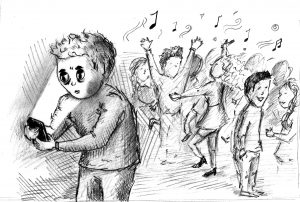Kids these days and their iPhones. They can’t even look up from them for one minute to speak with their father on the drive up to college. What are you doing? Facechatting? What are you tweetering about? Are you enjoying my Bee Gees CD?
I probably sound like your suburban, t-shirt-tucking, clean-shaven father, and that’s because I am. Even though I need help uploading the Christmas photos to Facebook, today I’m here to tell you that sometimes I’m still right about stuff, okay?
For example, back in my day we used to have more face-to-face interactions with our parents in the car.
In all seriousness, many of you young people have been shown to use your phones to avoid talking with others. Take this Pew Research Center paper from 2015, which shows almost half of the participants under the age of 30 reported using their phone to avoid others around them.
Often people use their phone as a trick to pretend they don’t notice someone, but ignoring people this way is obvious and doesn’t solve any problems. It’s best to just awkwardly say, “hello.”
[media-credit name=”Genevieve Winn” align=”alignnone” width=”300″] [/media-credit]
[/media-credit]
Worst, perhaps, is the little-acknowledged move of taking out one’s phone when struggling to connect with others. Put away the phone and try harder to talk with someone new at that party this weekend instead of reaching into your pocket. If you give it a try, I promise you anyone will be more interesting than the Facebook feed you have already looked at.
On the other end of the spectrum is the increasingly challenging task of defending our leisure time from the threats of always-present connectivity we achieve with the use of our smartphones.
Among professionals, it is often a signal of status and importance that one must keep their phone on-hand long after work hours to send and receive emails. It is unclear that this overworked behavior even adds to our productivity because it may inhibit our ability to work harder during the day.
Smartphones are incredible and can be a responsible source of entertainment and a natural extension of our work lives. However, it is clear that we have not collectively figured out the proper etiquette with which to use these new devices.
Do you use your phone on a date? When is it appropriate to take out your phone during a party? What do you do when you need to check your phone on a busy sidewalk? I have my ideas on the way we should be- have, but I cannot pretend to know all the answers.
Our society won’t converge on these ideas next week or even next year, but I invite you to reflect just a little bit on the things we give up to stay connected without interruption. Oftentimes, it seems we’re always connected, but never fully connecting.
“Okay, Dad.”







